(House of Bhakti) – Nanda and Yaśodā’s Love for Kṛṣṇa
Chapter Eleven from the book, Bhakti-rasāyana, 4th edition by Śrīla Bhaktivedānta Nārāyaṇa Mahārāja
Next, in Sanātana Gosvāmī’s heart, feelings of vātsalya-bhāva begin to come, and he begins quoting verses describing that sentiment:
[śrī-rājovāca]
nandaḥ kim akarod brahman
śreya evaṁ mahodayam
yaśodā ca mahā-bhāgā
papau yasyāḥ stanaṁ hariḥ
Śrīmad-Bhāgavatam (10.8.46); Bṛhad-bhāgavatāmṛta (2.7.126)
[Śrī Parīkṣit Mahārāja asked:] My dear brāhmaṇa, which supremely auspicious sādhana did Nanda perform, and which austerities did the supremely fortunate Yaśodā undergo to have her breast-milk drunk by Śrī Hari?
Once, after Kṛṣṇa had eaten some soil, Mother Yaśodā forced Him to open His mouth, and when He did, she 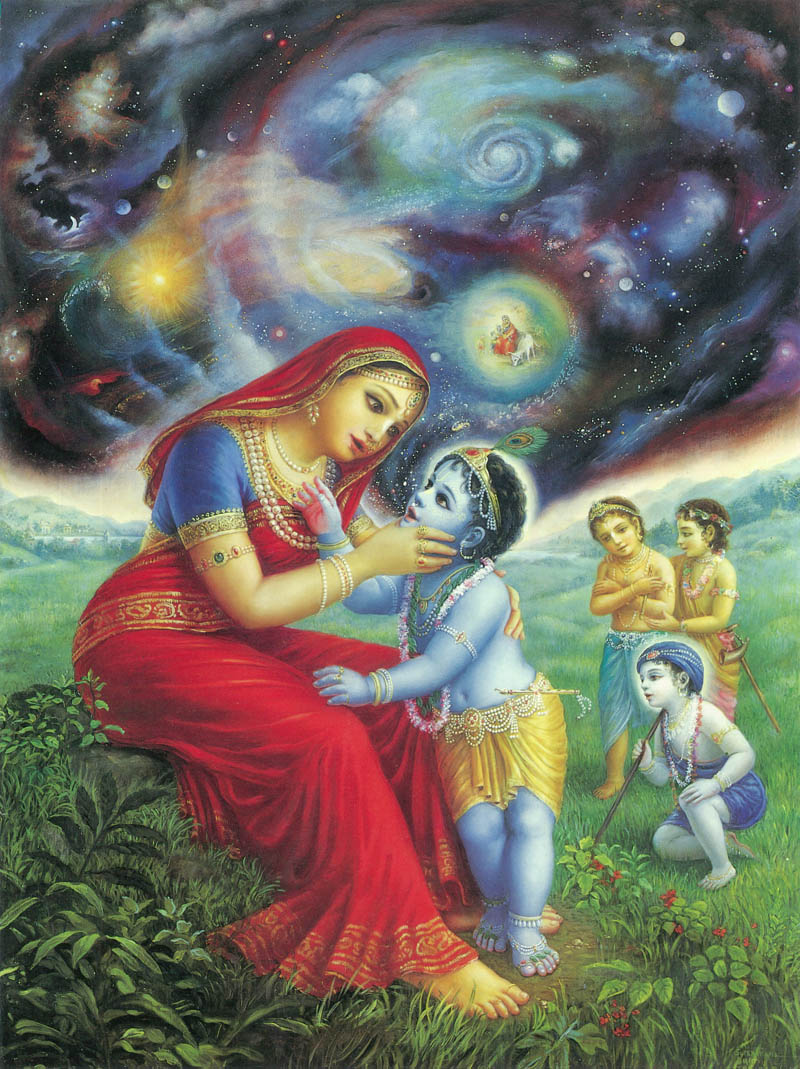 saw the entire creation therein. Seeing so many universes with so many Śivas and Viṣṇus, she thought, “What is this?” When Kṛṣṇa revealed His universal form (viśva-rūpa) to Arjuna, Arjuna thought “He is Bhagavān!” and with folded hands began offering prayers, but Yaśodā didn’t do this. Trembling, she thought, “Has a ghost possessed me? Has someone cast a spell on my child? Is this the illusory energy of the demigods, or what? What has happened to my child?” Rubbing her eyes in astonishment, she looked again and then it had all disappeared. She thought, “Whose illusory energy was this? How did it happen?” She didn’t consider that “He is the Supreme Lord!” She continued to see Him only as a small child.
saw the entire creation therein. Seeing so many universes with so many Śivas and Viṣṇus, she thought, “What is this?” When Kṛṣṇa revealed His universal form (viśva-rūpa) to Arjuna, Arjuna thought “He is Bhagavān!” and with folded hands began offering prayers, but Yaśodā didn’t do this. Trembling, she thought, “Has a ghost possessed me? Has someone cast a spell on my child? Is this the illusory energy of the demigods, or what? What has happened to my child?” Rubbing her eyes in astonishment, she looked again and then it had all disappeared. She thought, “Whose illusory energy was this? How did it happen?” She didn’t consider that “He is the Supreme Lord!” She continued to see Him only as a small child.
Being very frightened, she took Kṛṣṇa to the family priest and told him, “I saw something very astonishing within my child’s mouth. Someone must have cast a spell upon Him! Please rid Him of this curse.” The family priest said, “Don’t be afraid, we will immediately make Him all right. You bring some gold, some cloth and some cow dung, and bring some cows to give in charity to the brāhmaṇas.” After she had brought all of these things, the priest chanted the appropriate mantras and Mother Yaśodā’s mind was set at ease.
In this verse Parīkṣit Mahārāja says, “Considering Kṛṣṇa to be his son, Nanda Bābā loves Him so much; he takes Kṛṣṇa on his shoulders saying, ‘My dear son, my dear son!’ and for this reason he is mahodaya. But greater than him is Mother Yaśodā, who is mahā-bhāgā – the most fortunate! Although Hari steals away the hearts of everyone in the entire universe and is the nurturer of all, she takes Him on her lap and feeds Him breast milk! What auspicious activities did they perform in their previous lives to receive such benedictions?”
Now Sanātana Gosvāmī will begin describing the good fortune of Yaśodā and Nanda Bābā so that their mood of service will begin to arise within us. By hearing the descriptions of these pastimes, all the contamination within one’s heart will be eradicated, and feelings of spontaneous love for Kṛṣṇa will be permanently established there. If we hear these types of descriptions during the day and then meditate on them during the night, then that is called smaraṇa, and from that eventually samādhi will come, so is there any greater sādhana than this? When he was hearing the Bhāgavatam from Śukadeva Gosvāmī, Parīkṣit Mahārāja only continued listening and hardly spoke at all. Therefore this sādhana is also sādhya, the final result. By hearing hari-kathā one’s heart will be completely purified, whereas by practising any other limb of vaidhī-bhakti it won’t happen as quickly.
The Universal Form is an aspect of the Supreme Lord’s great divine opulence (aiśvarya), but upon seeing it, not 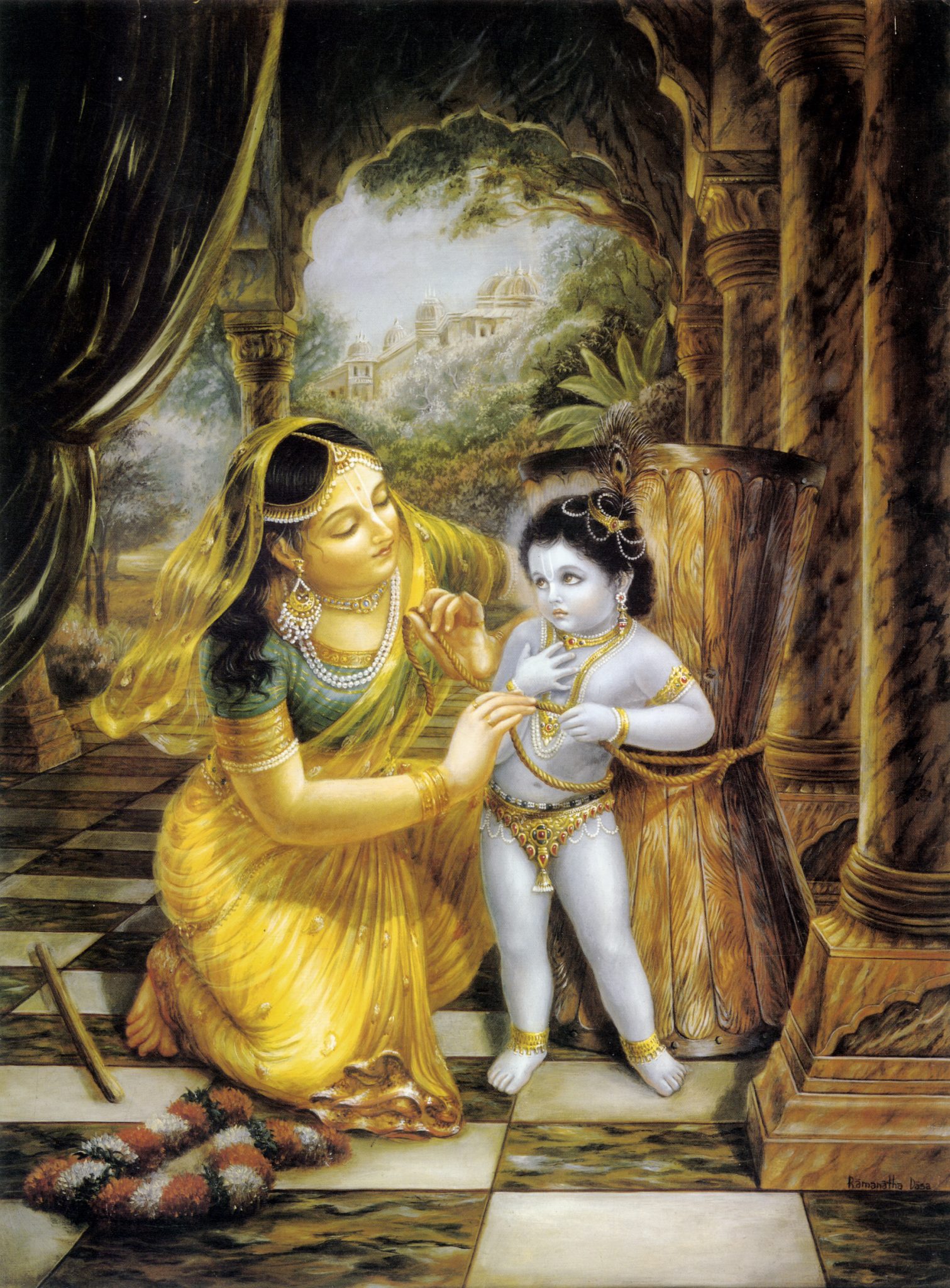 even a trace of aiśvarya-bhāva arose in Yaśodā. Instead her prema for Kṛṣṇa only increased, and continuing to see Him merely as a small child, she bathed Him in cow dung and cow urine for auspiciousness. Bhagavān is the personification of auspiciousness, yet to bring auspiciousness to Him, she sang some mantras and gave charity to the brāhmaṇas! Sanātana Gosvāmī says here in his commentary that if one hears these descriptions of Yaśodā endeavouring to bring auspiciousness to Kṛṣṇa, then very soon that same auspiciousness will come to that person. And if a sādhaka hears these descriptions with love and deeply meditates on them, then his tendencies towards aiśvarya-bhāva will be blocked and he will be able to feel pure vātsalya-bhāva. Therefore any trace of aiśvarya-bhāva was covered by Yogamāyā, and Yaśodā was able to taste mādhurya-bhāva (where a devotee never considers Kṛṣṇa to be Bhagavān Himself, but merely their dear friend, son or lover). Being wonderstruck, Parīkṣit Mahārāja is saying, “Aho! Yaśodā possesses even more good fortune than Nanda! Nanda is certainly fortunate – that is true; but Yaśodā is even more so because she was actually able to bind Kṛṣṇa, whereas Nanda could only later untie Him.”
even a trace of aiśvarya-bhāva arose in Yaśodā. Instead her prema for Kṛṣṇa only increased, and continuing to see Him merely as a small child, she bathed Him in cow dung and cow urine for auspiciousness. Bhagavān is the personification of auspiciousness, yet to bring auspiciousness to Him, she sang some mantras and gave charity to the brāhmaṇas! Sanātana Gosvāmī says here in his commentary that if one hears these descriptions of Yaśodā endeavouring to bring auspiciousness to Kṛṣṇa, then very soon that same auspiciousness will come to that person. And if a sādhaka hears these descriptions with love and deeply meditates on them, then his tendencies towards aiśvarya-bhāva will be blocked and he will be able to feel pure vātsalya-bhāva. Therefore any trace of aiśvarya-bhāva was covered by Yogamāyā, and Yaśodā was able to taste mādhurya-bhāva (where a devotee never considers Kṛṣṇa to be Bhagavān Himself, but merely their dear friend, son or lover). Being wonderstruck, Parīkṣit Mahārāja is saying, “Aho! Yaśodā possesses even more good fortune than Nanda! Nanda is certainly fortunate – that is true; but Yaśodā is even more so because she was actually able to bind Kṛṣṇa, whereas Nanda could only later untie Him.”
In this verse Parīkṣit Mahārāja addresses Śukadeva Gosvāmī as brāhmaṇa, and Sanātana Gosvāmī says in his commentary that Śukadeva Gosvāmī is the direct embodiment of Parabrahma. Generally a devotee is not referred to in this way, but he has done it because here brahma means he who is speaking such a high level of hari-kathā that it increases the prema in others. The jīva is part and parcel of Parabrahma, but when he takes shelter of Parabrahma, then he experiences prema as a part of the whole. Because Śukadeva Gosvāmī increases that prema, he has been referred to here as the direct embodiment of Parabrahma.
Parīkṣit Mahārāja is asking, “Which auspicious activities did Nanda and Yaśodā perform to receive Kṛṣṇa as 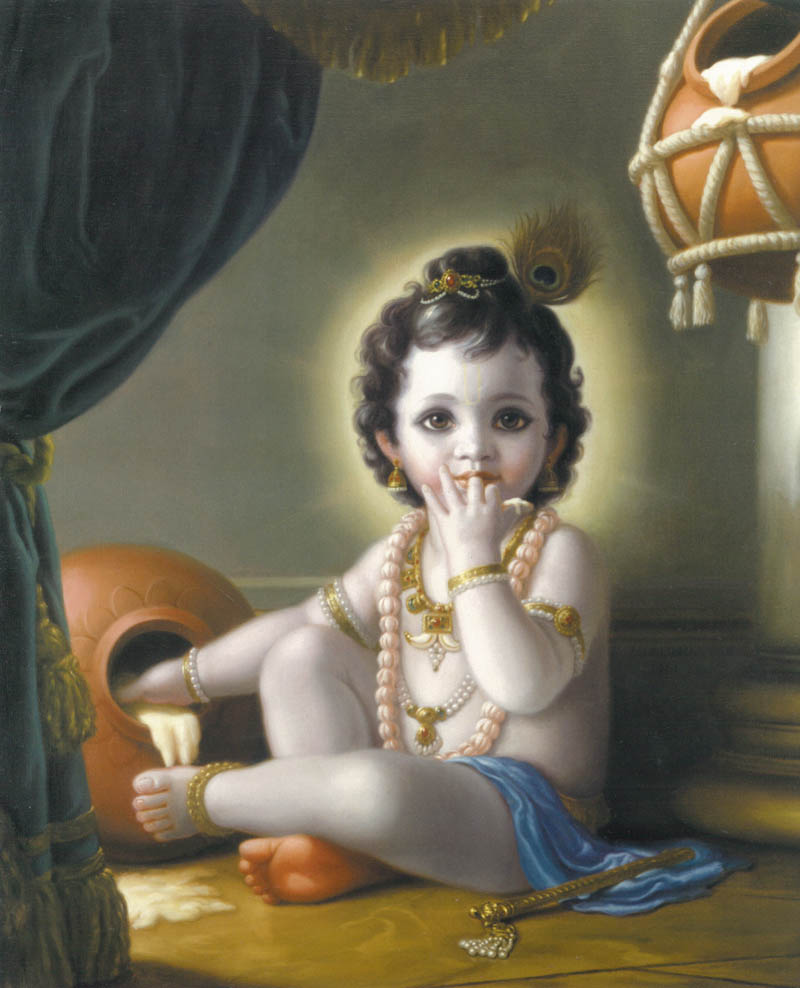 their son?” What activities did Prahlāda Mahārāja perform to receive such bhakti for Bhagavān? By unknowingly fasting and staying awake all night on Nṛsiṁha-caturdaśī, in his next life, while remaining in his mother’s womb, he heard the science of the Supreme Lord from Nārada for sixty thousand years, and after taking birth he became the great devotee Prahlāda Mahārāja. By keeping company with the spiritual master and the Vaiṣṇavas one becomes like that. For us also: if we observe Janmāṣṭamī, Gaura-pūrṇimā or Nṛsiṁha-caturdaśī by fasting and hearing hari-kathā all day and serving the spiritual master and the Vaiṣṇavas with great enthusiasm and love – even if it is not for sixty thousand years or even sixty years, but only for sixty months or even sixty days – then that is sādhana.
their son?” What activities did Prahlāda Mahārāja perform to receive such bhakti for Bhagavān? By unknowingly fasting and staying awake all night on Nṛsiṁha-caturdaśī, in his next life, while remaining in his mother’s womb, he heard the science of the Supreme Lord from Nārada for sixty thousand years, and after taking birth he became the great devotee Prahlāda Mahārāja. By keeping company with the spiritual master and the Vaiṣṇavas one becomes like that. For us also: if we observe Janmāṣṭamī, Gaura-pūrṇimā or Nṛsiṁha-caturdaśī by fasting and hearing hari-kathā all day and serving the spiritual master and the Vaiṣṇavas with great enthusiasm and love – even if it is not for sixty thousand years or even sixty years, but only for sixty months or even sixty days – then that is sādhana.
In the lives of all great devotees such as Rūpa and Sanātana this enthusiastic spirit can be seen. But being 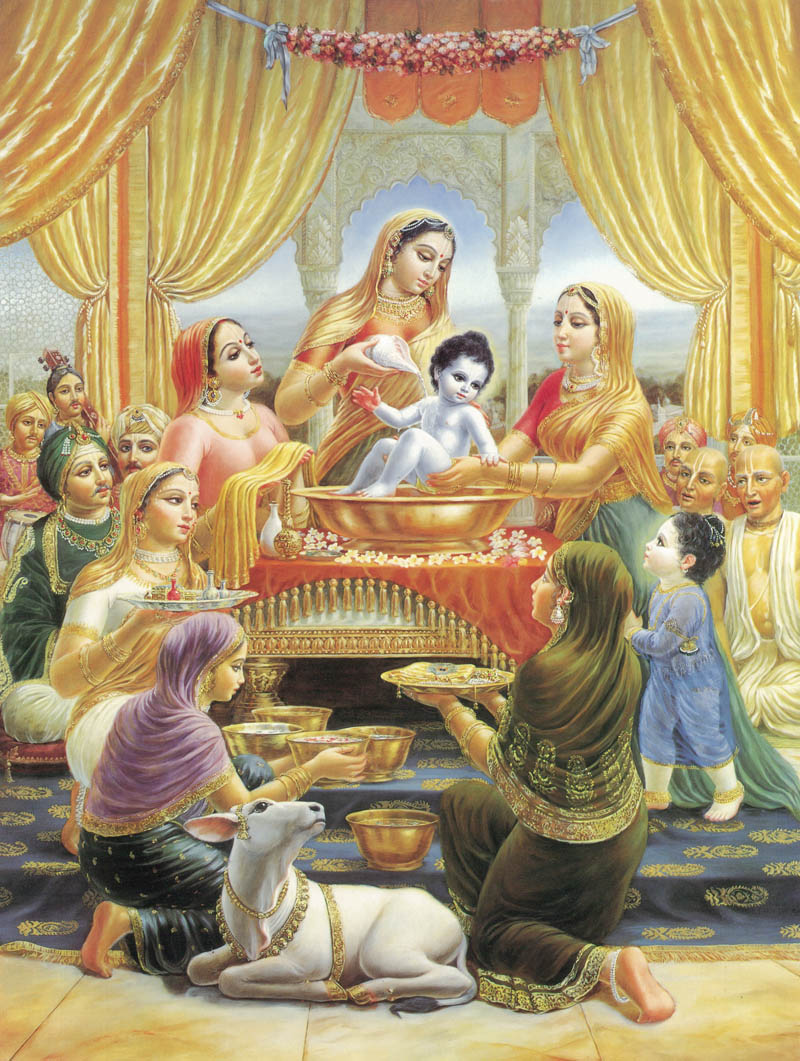 wonderstruck and feeling that it is impossible to perform such activities in this world that would bestow upon one the benediction of having Kṛṣṇa as their son, Parīkṣit Mahārāja is asking this question. He was completely astonished at the elevated vātsalya-prema that Yaśodā and Nanda possessed for Kṛṣṇa. Bhagavān has had many parents, but neither Vasudeva and Devakī, nor Daśaratha and Kauśalyā, nor Kaśyapa and Aditi possessed such a beautiful sentiment towards Him as did Yaśodā and Nanda. Vasudeva and Devakī were unable to taste the rasa of Kṛṣṇa’s pastimes; immediately after Kṛṣṇa’s birth Vasudeva took Him to Gokula, and there His pastimes began. On the first morning, Yaśodā was awakened by the sound of Kṛṣṇa crying, and then an immensely blissful festival was held. The news of Kṛṣṇa’s birth spread in all directions, and people came from all over to see Him. The residents of Gokula tasted the rasa of Kṛṣṇa’s childhood pastimes, but Vasudeva and Devakī were unable to taste even a little of it.
wonderstruck and feeling that it is impossible to perform such activities in this world that would bestow upon one the benediction of having Kṛṣṇa as their son, Parīkṣit Mahārāja is asking this question. He was completely astonished at the elevated vātsalya-prema that Yaśodā and Nanda possessed for Kṛṣṇa. Bhagavān has had many parents, but neither Vasudeva and Devakī, nor Daśaratha and Kauśalyā, nor Kaśyapa and Aditi possessed such a beautiful sentiment towards Him as did Yaśodā and Nanda. Vasudeva and Devakī were unable to taste the rasa of Kṛṣṇa’s pastimes; immediately after Kṛṣṇa’s birth Vasudeva took Him to Gokula, and there His pastimes began. On the first morning, Yaśodā was awakened by the sound of Kṛṣṇa crying, and then an immensely blissful festival was held. The news of Kṛṣṇa’s birth spread in all directions, and people came from all over to see Him. The residents of Gokula tasted the rasa of Kṛṣṇa’s childhood pastimes, but Vasudeva and Devakī were unable to taste even a little of it.
In their previous lives, Nanda was the Vasu demigod Droṇa and Yaśodā was his wife Dharā, and to obtain a very 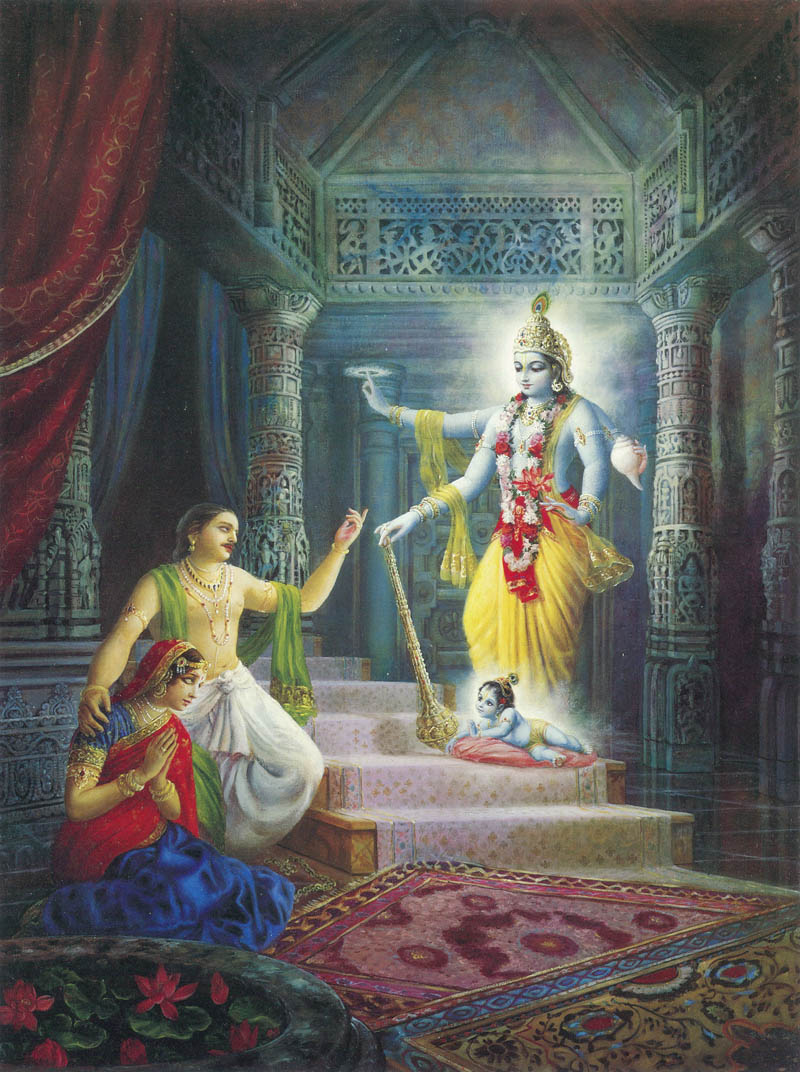 beautiful son they performed very severe austerities. After some time, Brahmā appeared before them and said, “You may ask any boon from me.” They said, “Just as parents love a son, we want to have love like that towards Bhagavān.” Brahmā said, “So it shall be.” Sanātana Gosvāmī also says that Vasudeva and Devakī in their previous lives were Kaśyapa and Aditi, and they performed austerities until Bhagavān Himself appeared before them and said, “What do you desire?” They replied, “We desire a son like You.” Bhagavān said, “There is no one like Me, so I Myself will become your son.”
beautiful son they performed very severe austerities. After some time, Brahmā appeared before them and said, “You may ask any boon from me.” They said, “Just as parents love a son, we want to have love like that towards Bhagavān.” Brahmā said, “So it shall be.” Sanātana Gosvāmī also says that Vasudeva and Devakī in their previous lives were Kaśyapa and Aditi, and they performed austerities until Bhagavān Himself appeared before them and said, “What do you desire?” They replied, “We desire a son like You.” Bhagavān said, “There is no one like Me, so I Myself will become your son.”
Bhagavān gave that boon Himself, and before this Brahmā had given that boon. But if Brahmā did not have vātsalya-prema himself, then how could he possibly give it? The answer is that Bhagavān protects the words of His devotees, but also because Brahmā knows past, present and future, he knew that Bhagavān would soon be taking birth in Gokula and performing childhood pastimes, so he gave his boon to Droṇa and Dharā, and Bhagavān fulfilled his words and later came as their son.
Were Droṇa and Dharā ordinary jīvas? No, they were plenary portions of Nanda and Yaśodā who, to show the people of this world what type of sādhana is necessary to completely overpower Bhagavān, performed severe austerities to receive the boon of having Bhagavān as their son. Both Bhagavān and His devotees can give boons, but the devotee’s boon will certainly be more powerful and more filled with rasa. Therefore Bhagavān fulfilled the boon given to Droṇa and Dharā, and in their next lives they appeared in their original forms as Nanda and Yaśodā and received Kṛṣṇa as their son.
In comparison to the boons given by Bhagavān Himself, the boon given by the devotee will be superior and bestow a higher taste. If Rāmacandra has taken a vow and Hanumān has also taken a vow, then if their vows conflict, whose vow will be triumphant? Once, seeing the offences of some man, Rāmacandra told him, “Tomorrow morning I shall come and certainly kill you.” So who could save him? No one could save him. Later that day, as Nārada was walking along, he came across this man, and seeing his face, said, “My friend, what is wrong? Why does your face appear withered in despair?”
The man said, “Rāmacandra has vowed that tomorrow He will certainly kill me.” Grasping Nārada’s feet, he 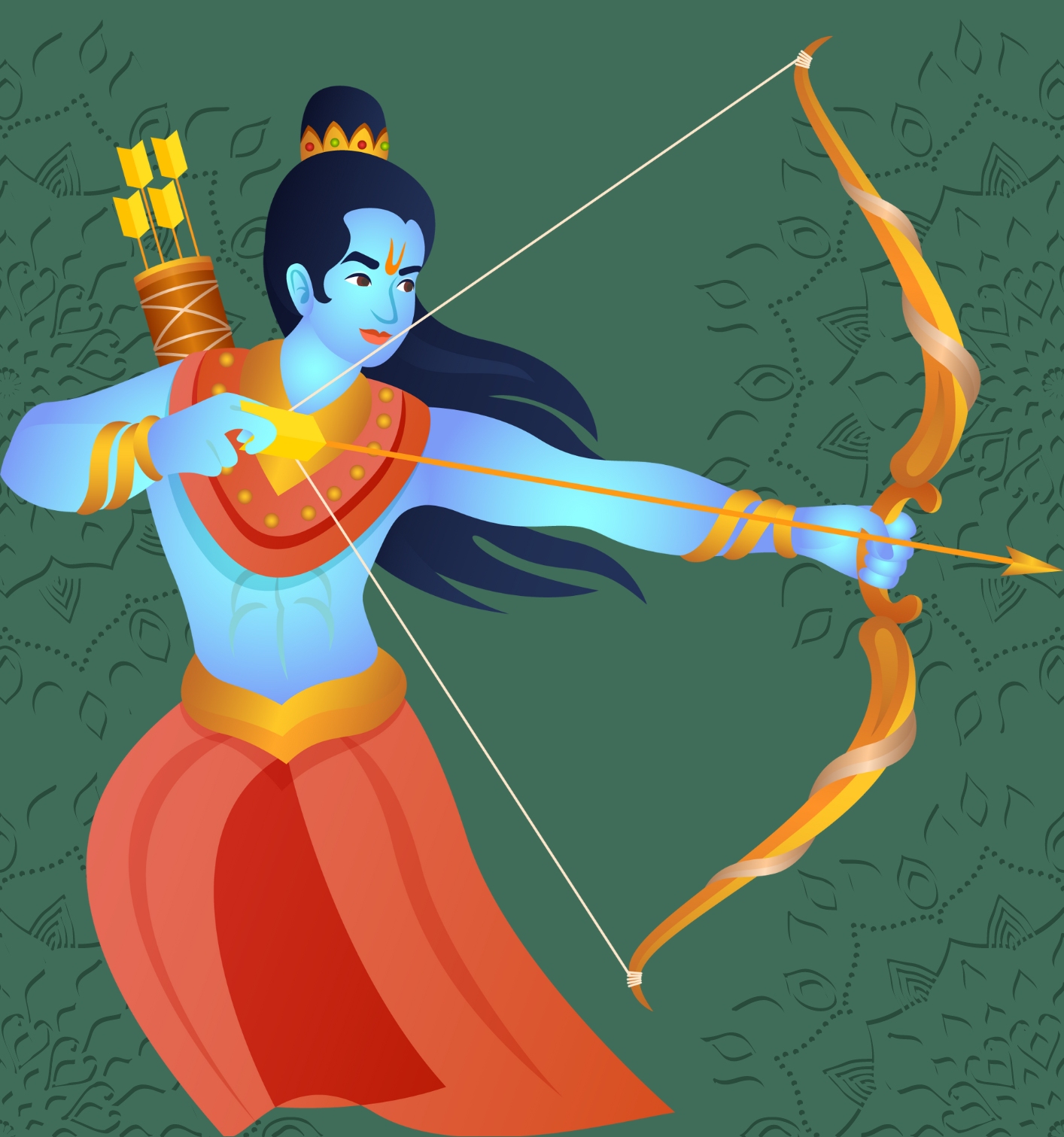 cried, “O my Lord, please protect me!”
cried, “O my Lord, please protect me!”
Nārada said, “Me? I am not able to save you, but you can do one thing: go and grasp the feet of Hanumān, and don’t let go! Don’t tell him the reason you have grasped his feet, but just beg him to make a vow to always protect you. Then afterwards you may reveal to him the specific nature of your dilemma.”
So this man approached Hanumān, and falling on the ground, grasped his feet and cried out, “O Prabhu! Please protect me, please protect me!”
Hanumān said, “Hey! What do you want? Let go of my feet!”
“No Prabhu, I will never let go! Only when you vow to always protect me will I let go!”
“All right, all right, I will always protect you, so what is it?”
“Rāmacandra has vowed that before the sun rises tomorrow morning He will certainly kill me.”
“Oh, I see! So who told you to do this? You must have met some intelligent man… or do you have a guru?”
“It was Nārada.”
This is Nārada’s nature, sometimes creating a quarrel between Bhagavān and His servants. So when the 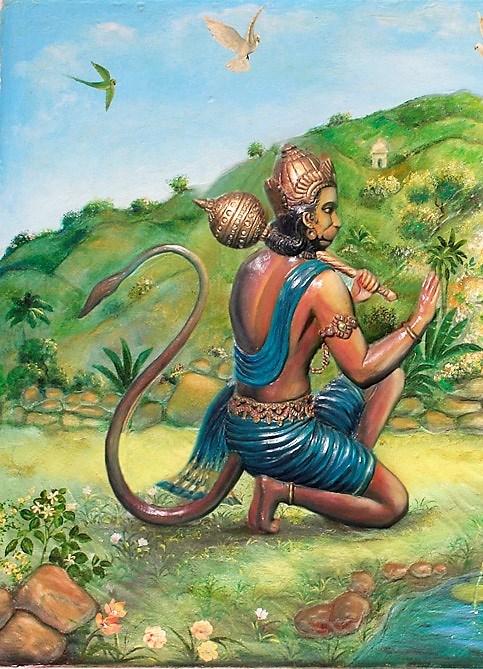 morning came, Hanumān told the man, “Just stand behind me, and everything will be all right.” Seeing that Rāma was coming, Hanumān picked up His club and assumed a fighting posture. Fixing an arrow to His bow, Rāma said, “Now I will kill this offender.”
morning came, Hanumān told the man, “Just stand behind me, and everything will be all right.” Seeing that Rāma was coming, Hanumān picked up His club and assumed a fighting posture. Fixing an arrow to His bow, Rāma said, “Now I will kill this offender.”
Hanumān replied, “My Lord, if You desire to kill him, it will only be over my dead body! I have vowed always to protect him.” Then Rāma retracted His vow and honoured the vow of Hanumān. Amongst all of His qualities, Bhagavān’s special affection for His devotees is the supreme quality. Therefore He fulfilled the boon that Brahmā had given to Droṇa and Dharā.
We are more interested in taking shelter of Bhagavān’s top-most loving (parama-premī ) devotees. It is a special characteristic of those of us in the Gauḍīya-sampradāya that we don’t actually take shelter of Kṛṣṇa. Even though He is the one who possesses all śakti, who is the unlimited ocean of rasa, who is supremely merciful, who is especially affectionate to His devotees, who is beginningless and who is the cause of all causes, who is it that we take shelter of? Śrīmatī Rādhikā – and if we don’t directly take shelter of Her, then we take shelter of Lalitā or Viśākhā and aspire to become the dāsī of the dāsī of the dāsī of Rādhikā. We should always consider ourselves to be the devotee of the devotee of the devotee, and then Kṛṣṇa will be more pleased with us. He has said, “One who says that he is My devotee is not really My devotee. But he who says that he is the devotee of My devotee is more dear to Me.”
Next comes this verse:
tato bhaktir bhagavati
putrī-bhūte janārdane
dampatyor nitarām āsīd
gopa-gopīṣu bhārata
Śrīmad-Bhāgavatam (10.8.51); Bṛhad-bhāgavatāmṛta (2.7.127)
[Śrī Śukadeva Gosvāmī replied:] O Bharata, for fulfilling the promise of His dear devotee Brahmā, Śrī Kṛṣṇa, the Supreme Lord Himself and the destroyer of evil, appeared as the son of Nanda and Yaśodā. In comparison to all of the other gopas and gopīs, this couple possessed the most love for Him.
In this verse Śukadeva Gosvāmī addresses Parīkṣit Mahārāja as bhārata. The ordinary meaning is that Parīkṣit 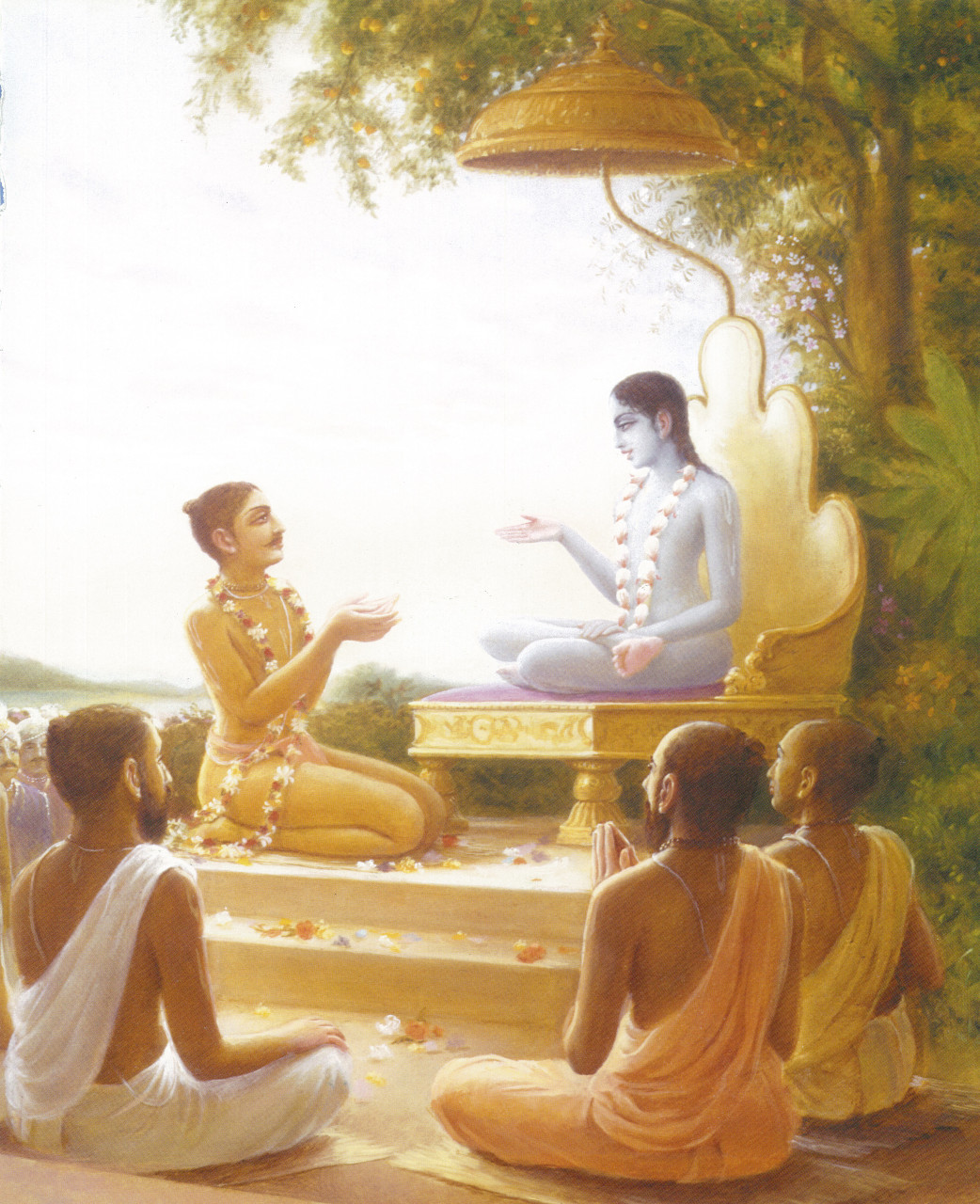 Mahārāja was the leader of his dynasty after the great war at Kurukṣetra, but the word bhārata can also be interpreted like this: bhā can mean bhavati, and rata can mean rati. So since the actual meaning is he who has special rati or prema for the feet of Bhagavān, just see the respect Śukadeva Gosvāmī is giving him! This verse says that in Vraja there were a great many couples of gopas and gopīs who had offspring, and all of these couples had vātsalya-prema for Kṛṣṇa. Desiring to taste their parental love, Kṛṣṇa expanded into the cowherd boys and became their son for one year during which time He tasted that vātsalya-rasa, and so also did all of the parents as they nurtured Him. But amongst all of these couples, Yaśodā and Nanda still had stronger feelings of vātsalya for Him than anyone. The other couples loved Kṛṣṇa even more than their sons, and only when He expanded into their sons during the pastime of bewildering Lord Brahmā did they show equal affection to their sons.
Mahārāja was the leader of his dynasty after the great war at Kurukṣetra, but the word bhārata can also be interpreted like this: bhā can mean bhavati, and rata can mean rati. So since the actual meaning is he who has special rati or prema for the feet of Bhagavān, just see the respect Śukadeva Gosvāmī is giving him! This verse says that in Vraja there were a great many couples of gopas and gopīs who had offspring, and all of these couples had vātsalya-prema for Kṛṣṇa. Desiring to taste their parental love, Kṛṣṇa expanded into the cowherd boys and became their son for one year during which time He tasted that vātsalya-rasa, and so also did all of the parents as they nurtured Him. But amongst all of these couples, Yaśodā and Nanda still had stronger feelings of vātsalya for Him than anyone. The other couples loved Kṛṣṇa even more than their sons, and only when He expanded into their sons during the pastime of bewildering Lord Brahmā did they show equal affection to their sons.
He also expanded into the calves so that the cows could taste vātsalya-rasa, and of course He was also the son of Devakī and Vasudeva. But as described in the previous verse, no one experienced the ecstasy which Yaśodā did as Kṛṣṇa drank from her breasts. Devakī could have only experienced this for a few seconds because immediately after Kṛṣṇa took birth He was taken to Gokula. At that time milk came to her breasts, and Kṛṣṇa was a small baby of a suitable age to drink her milk, but He was taken away. When Kṛṣṇa first appeared to them in the jail, with folded hands they had offered prayers; but later, when Kṛṣṇa returned to Mathurā and freed them, Kṛṣṇa covered their aiśvarya-bhāva by His Yogamāyā. He sat on Devakī’s lap and cried “Mother, Mother!”, but at that time she could not feed Him breast milk. Eleven years had elapsed, and the opportunity to breastfeed Kṛṣṇa had long passed.
So this verse says that this dampatī, this couple Yaśodā and Nanda, were superior to all the other couples of 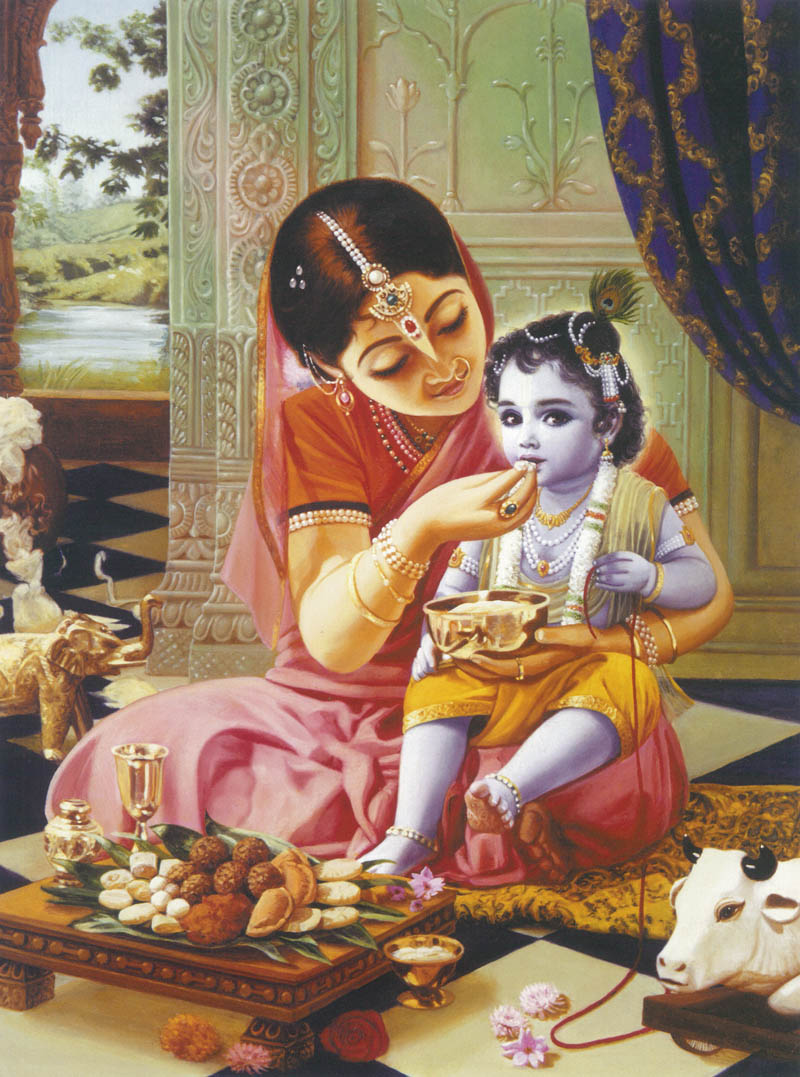 gopas and gopīs in Vraja. They experienced innumerable wonderful sentiments of parental love, but very few of them have actually been described in Śrīmad-Bhāgavatam. The pastime where Dāmodara was bound by Yaśodā is described, and it also describes the time when Kṛṣṇa was very small He got up from Yaśodā’s lap and began to crawl towards the door. But hearing some jingling sound, He turned around wondering where that sound was coming from and was astonished to find that it was the jingling of His ankle bells. Then at once Yaśodā caught Him and placed Him back on her lap. Devakī never experienced any of this, and no other gopī in Vraja ever experienced so many feelings of vātsalya. The Bhāgavatam has described only a few of these pastimes, but Yaśodā felt countless millions of wonderful sentiments, such as when Kṛṣṇa played and when He drank her breast-milk. And to understand her elevated sentiments for Kṛṣṇa is very difficult.
gopas and gopīs in Vraja. They experienced innumerable wonderful sentiments of parental love, but very few of them have actually been described in Śrīmad-Bhāgavatam. The pastime where Dāmodara was bound by Yaśodā is described, and it also describes the time when Kṛṣṇa was very small He got up from Yaśodā’s lap and began to crawl towards the door. But hearing some jingling sound, He turned around wondering where that sound was coming from and was astonished to find that it was the jingling of His ankle bells. Then at once Yaśodā caught Him and placed Him back on her lap. Devakī never experienced any of this, and no other gopī in Vraja ever experienced so many feelings of vātsalya. The Bhāgavatam has described only a few of these pastimes, but Yaśodā felt countless millions of wonderful sentiments, such as when Kṛṣṇa played and when He drank her breast-milk. And to understand her elevated sentiments for Kṛṣṇa is very difficult.
When Uddhava visited Vṛndāvana, he saw Nanda and Yaśodā. Nanda was weeping bitterly, and Uddhava could not understand why he was crying. Even right up until the very end of his stay in Vraja he did not fully understand why Nanda was crying so bitterly. Uddhava thought, “Kṛṣṇa is Parabrahma, He cannot really be anyone’s son! So towards Him, Nanda has such feelings? Is this some kind of illusion, or what? I know full well that Kṛṣṇa is Bhagavān, so how can I be attached to the idea that He is my friend?” Uddhava could only feel aiśvarya-bhāva towards Bhagavān, so seeing this bhāva in Nanda Bābā, he couldn’t understand it. This is how he felt coming before the great mountain of Nanda Bābā’s mādhurya-bhāva. When we look at a one-storey building, our heads can be held level looking straight ahead. But when we look up at a seven-storey building, then we must tilt our head back slightly. And when we look up at a high mountain, we must tilt our heads back to the point where if we are wearing a hat, it will fall off. So looking up at the towering mountain of Nanda Bābā’s mādhurya-bhāva, it was as if Uddhava’s hat of aiśvarya-bhāva fell off! Being so intelligent, a scholar and a disciple of Bṛhaspati, still Uddhava couldn’t understand, “Why is he crying like this? This is certainly a matter of great good fortune, that Kṛṣṇa has appeared in his home! Okay, so Kṛṣṇa told me that I should give His parents some consolation. But what will I say? Will I say, ‘Nanda Bābā, you are so fortunate! If there is any person in this entire universe who is fortunate, it is you! Please cry more and more! It is said that if even one tear is shed for Bhagavān, then one’s life has become completely successful!’ Devotees pray for the day when upon hearing descriptions of Bhagavān’s pastimes, taking His name, and seeing the places where He has performed His pastimes, they will shed tears and their voices will become so choked that they won’t even be able to pronounce His name properly! And here I see Nanda Bābā crying, and how is he crying? Very bitterly, like he will never stop!”
towards Bhagavān, so seeing this bhāva in Nanda Bābā, he couldn’t understand it. This is how he felt coming before the great mountain of Nanda Bābā’s mādhurya-bhāva. When we look at a one-storey building, our heads can be held level looking straight ahead. But when we look up at a seven-storey building, then we must tilt our head back slightly. And when we look up at a high mountain, we must tilt our heads back to the point where if we are wearing a hat, it will fall off. So looking up at the towering mountain of Nanda Bābā’s mādhurya-bhāva, it was as if Uddhava’s hat of aiśvarya-bhāva fell off! Being so intelligent, a scholar and a disciple of Bṛhaspati, still Uddhava couldn’t understand, “Why is he crying like this? This is certainly a matter of great good fortune, that Kṛṣṇa has appeared in his home! Okay, so Kṛṣṇa told me that I should give His parents some consolation. But what will I say? Will I say, ‘Nanda Bābā, you are so fortunate! If there is any person in this entire universe who is fortunate, it is you! Please cry more and more! It is said that if even one tear is shed for Bhagavān, then one’s life has become completely successful!’ Devotees pray for the day when upon hearing descriptions of Bhagavān’s pastimes, taking His name, and seeing the places where He has performed His pastimes, they will shed tears and their voices will become so choked that they won’t even be able to pronounce His name properly! And here I see Nanda Bābā crying, and how is he crying? Very bitterly, like he will never stop!”
It is said that if someone sheds a tear out of love for Bhagavān, then their life will automatically become successful and they will become the purifier of the three worlds. In one place Uddhava has said:
vande nanda-vraja-strīṇāṁ
pāda-reṇum abhīkṣṇaśaḥ
yāsāṁ hari-kathodgītaṁ
punāti bhuvana-trayam
Śrīmad-Bhāgavatam (10.47.63)
I repeatedly offer my respects to the dust from the feet of the women of Nanda Mahārāja’s cowherd village. When they loudly sing the glories of Śrī Kṛṣṇa, the vibration purifies the three worlds.
Why does their kathā purify the three worlds? The tearful, deeply emotional songs which they sang to one another became verses in the Tenth Canto of Śrīmad-Bhāgavatam, and the scriptures say that when one attains the darśana of such a great personality who is crying in this way, one’s life becomes successful. But do we ever cry while describing Kṛṣṇa’s pastimes or while chanting His name? So tell me, then – how fortunate is Nanda Bābā to be crying, considering Kṛṣṇa to be his son?
So Uddhava was thinking, “Will I say, ‘Nanda Mahārāja, you are most fortunate, so please cry more and more  because by receiving your darśana today my life has become successful’? That will be like adding ghee to the fire! But if I say, ‘Nanda Mahārāja, please don’t cry, be peaceful’, then that will be opposed to what is said in the scriptures.” This was Uddhava’s curious predicament, and it was as if he were trapped. “If I tell him not to cry, it will be opposed to the words of the scriptures and I will be punished, and if I tell him to cry more, I will not be consoling him as Kṛṣṇa asked me to. Should I tell him to stop crying, or to cry even more?” He was unable to reach a decision, so in the end he mixed them both by saying, “Nanda Mahārāja, you are the most fortunate person, but please don’t cry.” In this way he was perplexed because Kṛṣṇa had instructed him to console His parents.
because by receiving your darśana today my life has become successful’? That will be like adding ghee to the fire! But if I say, ‘Nanda Mahārāja, please don’t cry, be peaceful’, then that will be opposed to what is said in the scriptures.” This was Uddhava’s curious predicament, and it was as if he were trapped. “If I tell him not to cry, it will be opposed to the words of the scriptures and I will be punished, and if I tell him to cry more, I will not be consoling him as Kṛṣṇa asked me to. Should I tell him to stop crying, or to cry even more?” He was unable to reach a decision, so in the end he mixed them both by saying, “Nanda Mahārāja, you are the most fortunate person, but please don’t cry.” In this way he was perplexed because Kṛṣṇa had instructed him to console His parents.
Sitting nearby was another fortunate soul, Yaśodā. Her tears had long dried up; the poor woman could not even shed tears. Her eyes were sunken in and she appeared like a skeleton. In one sense she died on the day Akrūra took Kṛṣṇa to Mathurā, and later she sent a message to Kṛṣṇa, “I don’t even have the qualification to call You ‘my son’. Now, having gone to Mathurā, You have accepted Devakī as Your mother and Vasudeva Mahārāja as Your father. For eleven years here, You were our very lives. As Your dhātrī – the one who raised You – I held You in my lap and protected You, and I did everything one could expect from a dhātrī. Koels lay their eggs in the nest of a crow, and then the crow sits on the eggs until they hatch. When they have hatched, then the mother koel returns and takes the chicks to her own nest and raises them there, and the crow just remains gazing in their direction. Our situation is exactly like that.”
Then Kṛṣṇa sent this message back to Yaśodā with Uddhava: “Because you have used the word dhātrī to describe yourself, Baladeva and I should give up our lives at once! I am sustaining My life solely to see you 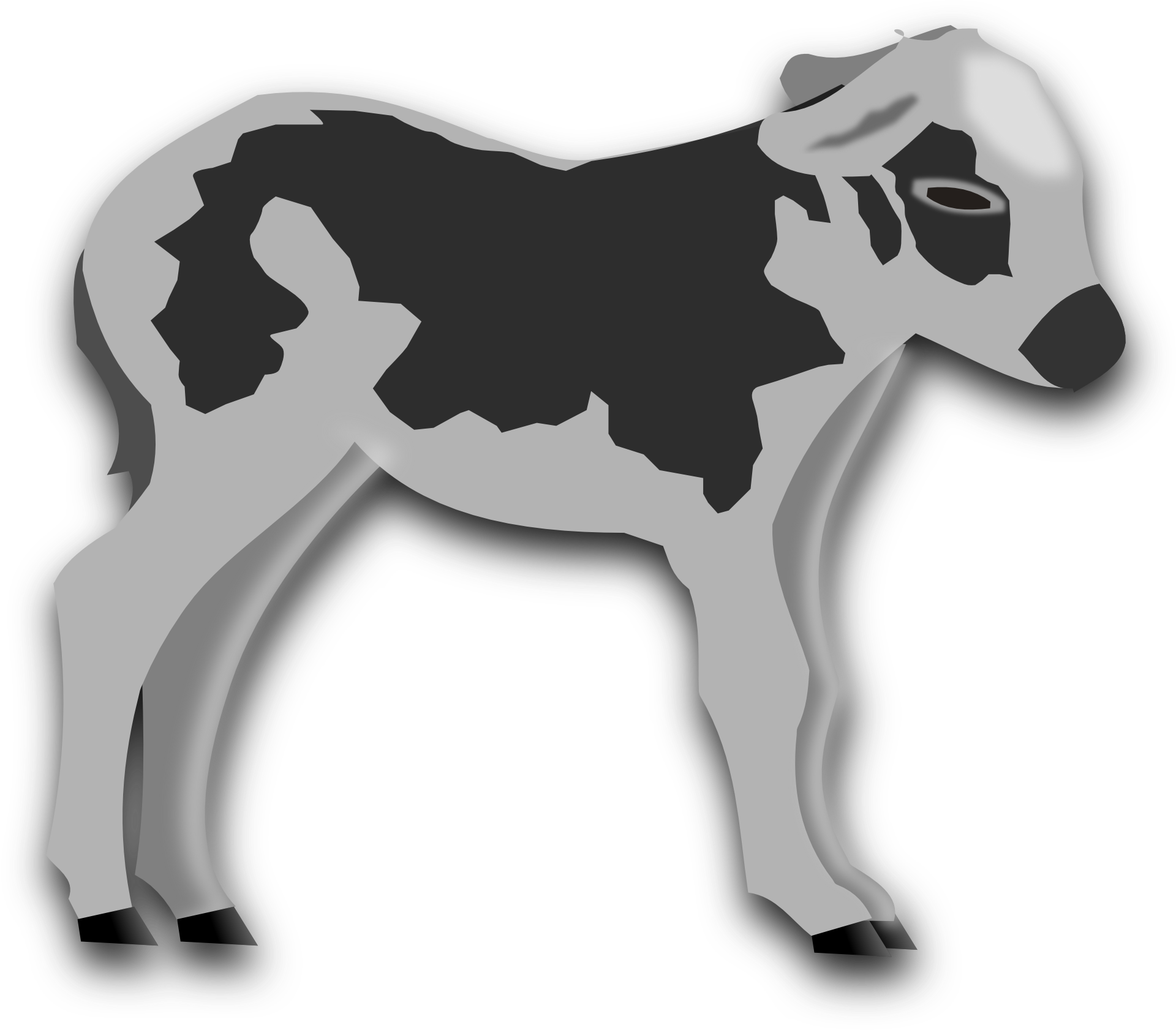 again; otherwise I would die today. We will certainly be returning to you soon because besides you we don’t know any other mother. Therefore, Mother, please do one thing: Father will be crying, the cows and calves will be crying, the plants which I planted will be drying up, and the calves which we used to take out to graze will no longer be taken out and will begin dying. Please look after them a little; they will even give up eating out of separation from Me.” Seeing and hearing all of this, Uddhava was wonderstruck. Yaśodā was unable to speak; she could only softly stammer. The affection of Yaśodā for Kṛṣṇa, her vātsalya-prema, was unlimited, like a fathomless ocean. Uddhava was not able to give her any consolation. Our gosvāmīs have not described much of this vātsalya-bhāva, because there are very few who are actually qualified to hear it. Therefore they have kept it hidden.
again; otherwise I would die today. We will certainly be returning to you soon because besides you we don’t know any other mother. Therefore, Mother, please do one thing: Father will be crying, the cows and calves will be crying, the plants which I planted will be drying up, and the calves which we used to take out to graze will no longer be taken out and will begin dying. Please look after them a little; they will even give up eating out of separation from Me.” Seeing and hearing all of this, Uddhava was wonderstruck. Yaśodā was unable to speak; she could only softly stammer. The affection of Yaśodā for Kṛṣṇa, her vātsalya-prema, was unlimited, like a fathomless ocean. Uddhava was not able to give her any consolation. Our gosvāmīs have not described much of this vātsalya-bhāva, because there are very few who are actually qualified to hear it. Therefore they have kept it hidden.
The word janārdane comes in this verse, and two meanings have been given for it. The one who destroys whatever is opposed to devotion and establishes bhakti is called Janārdana, and ardana can also mean a prayer. Therefore it can refer to Droṇa and Dharā, who prayed to Brahmā for receiving that Janārdana as their son, whose prayers were completely fulfilled, and who tasted the highest degree of vātsalya-bhāva. Nanda and Yaśodā’s bhāva is higher than the vātsalya-bhāva of all the other gopas and gopīs in Vraja, and this is the purport of this verse.
Source: Purebhakti.com
Image(s) made possible by Pixabay.com, Krishnapath.org and/or Bhaktiart.net
Unless indicated differently, all verse translations and quotes are from the books by Śrīla Prabhupāda (Vedabase.com)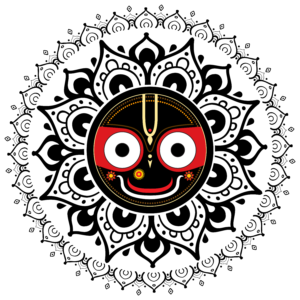
[ad_2]
#Nanda #Yaśodās #Love #Kṛṣṇa







